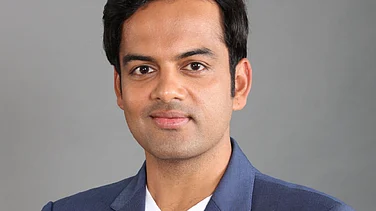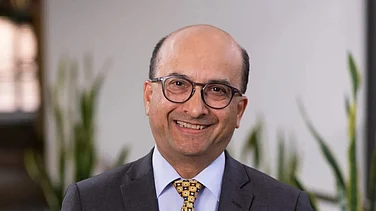In Indian Inc today, women leaders have greater visibility, a strong network that advocates for them, and more seats in the table, says Ananya Birla, founder of Svatantra Microfin and co-founder of Mpower, in an exclusive interview with Outlook Business on the occasion of International Women’s Day. Birla also shares her take on the working hours debate and its impact on the female workforce, and the role women entrepreneurs can play in India’s growth story.
The roles and responsibilities of those working in the corporates have become more demanding. As someone who started working at a young age, how have you navigated those challenges?
Starting young meant I had to learn on the go—whether it was managing multiple ventures or constantly upskilling to navigate different domains. I had to prove myself constantly, but I turned that pressure into fuel. I’ve always believed that challenges are opportunities in disguise.
What’s helped me navigate these demands is a mix of learning to show up regularly, staying true to my vision – my ‘whys’, and surrounding myself with a team that shares my drive.
India Inc. leaders have been debating working hours for early-career professionals and the end of hybrid working models. Do you think this would negatively impact women’s participation in the workforce?
The discussion around working hours is complex, with valid arguments on both sides. But it’s also important to understand that flexibility has played a crucial role in increasing workforce participation, especially when balancing career, caregiving responsibilities and performance barriers.
The focus should be on outcome-driven work cultures rather than rigid structures. Organizations that invest in progressive policies—such as flexible hours and leadership pathways—will not only retain diverse talent but also drive long-term innovation and growth. In my experience, if there is strong performance, and the team is collaborating, it’s manageable.
A 2024 survey found that women in senior leadership roles account for 18.3% in India, a decline from 2023. In your experience, what are the key hurdles women leaders face in advancing their careers?
I was reading about the "broken rung" phenomenon, which I think could be one of the larger barriers. It states that women are less likely to be promoted from entry-level to first management roles, shrinking the leadership pipeline. Many workplaces are too rigid to accommodate the shifts that come with personal well-being. At the leadership level, I think there is a need for greater support and synergy through forums and networks for women.
The model of sacrificing everything for career advancement discourages many talented women. It’s important to see that leadership roles can be both fulfilling and compatible with a whole life. These could be some of the reasons behind the declining numbers in India’s workforce statistics.
I hope more women own their ambition and openly express their leadership aspirations. The unequal burden of domestic responsibilities remains a challenge, often disrupting careers. Addressing these gaps can create a more equitable workplace.
What do you think the role women entrepreneurs are playing today in India’s growth story? Where do you see yourself in that bigger story?
I believe that financial independence for women, among other factors is key. This is what makes me a firm believer in microfinance – I believe that a microloan can start a cycle of generational transformation in a family. I have witnessed this at Svatantra. I do believe a part of the answer lies in fueling India’s entrepreneurial spirit in remote corners and exploring how MSMEs are the backbone of the economy.
You serve as a director for various Aditya Birla Group companies and as a founder and chairperson of the firms that you have started. How do you manage multiple leadership positions across different industries and what are your key learnings?
Operating in diverse sectors gives me a unique vantage point to apply learnings from one industry to another, often leading to unexpected breakthroughs.
One of my key learnings is that patience is one of the most underrated strengths in leadership. It’s not about waiting idly, but it’s about trusting the process, making deliberate decisions, and knowing when to push forward versus when to hold steady.
I also believe in surrounding myself with an able team. When in doubt, I go back to ‘First Principles’ thinking. At its core, it’s about breaking down problems to their fundamental truths and building solutions from the ground up. It’s the practice of questioning every assumption you think you know about a given problem, then creating new solutions from scratch.
Mental health at the workplace is one of the key issues raised in recent years, and you have been advocating for it through the social enterprise arm Mpower and Ananya Birla Foundation. What are the ways in which you promote the mental health of employees?
We offer mental health/wellness leave. But apart from that, I also believe in modeling healthy boundaries and discussing my own mental wellness practices openly. I believe in normalizing mental health challenges before they become a crisis.
While bringing awareness to mental illness is important, it’s equally important to talk about mental well-being. For instance, neuroscience research shows that positive affirmations can enhance activity in the prefrontal cortex of the brain, responsible for higher-order thinking and decision-making. The practice of affirmation can also increase dopamine and serotonin levels and reduce stress-related cortisol levels.
We also design our work processes in such a way that we prevent burnout. This includes realistic project timelines, adequate resources, and clear priorities to prevent chronic work overload.
You started your own company at the age of 17 and it’s been more than a decade since you’ve started working. What are positive changes that you have seen, particularly for women in leadership, and most importantly, what remains unchanged?
Women in leadership today have greater visibility, stronger networks of women advocating for other women, and more seats at the table, with workplaces increasingly valuing diverse perspectives. But social biases still persist. I’d really like to witness that point where leadership is seen as gender-neutral, not an exception for women.
Advanced technology, particularly the use of AI, is changing the way we work today. How do you embrace that change as a leader, and to what extent do you encourage its usage?
We can’t talk about tech today without talking about AI. I believe that India has a vital role to play in shaping this discourse, and we shouldn’t shy away from being at the forefront.
My team has built multiple AI systems and tools—both for internal optimization and external scalability—to support India's growing knowledge economy. Even within our consumer businesses, we are looking to leverage AI to empower our sales and marketing teams with data-driven insights, enhancing decision-making and efficiency. We encourage its usage where it amplifies human potential-streamlining tasks, unlocking insights, and driving innovation.
We don’t see AI as a replacement for humans. Instead, if designed well, AI can transform how we work, enabling us to focus on what makes us truly human: creativity, innovation, empathy, and vision.




























